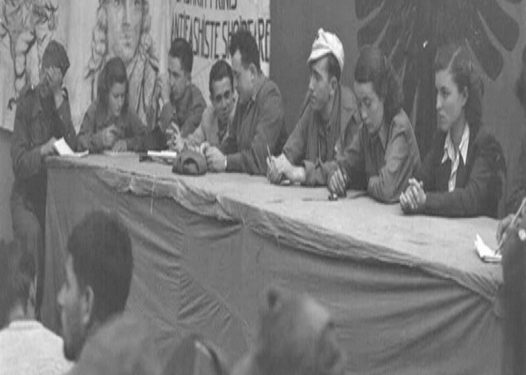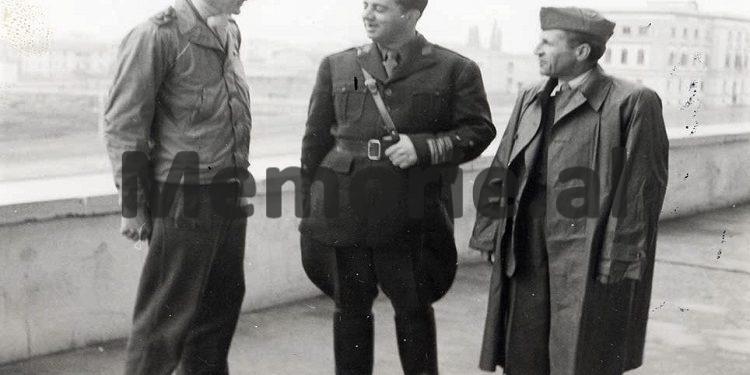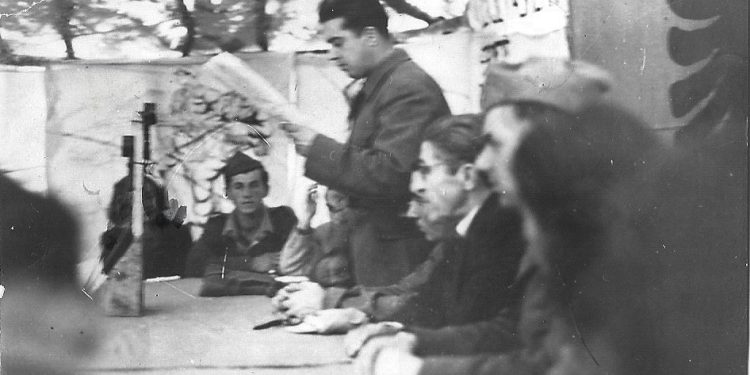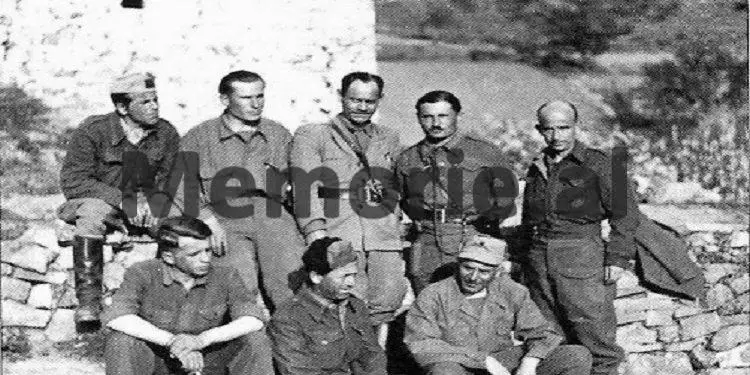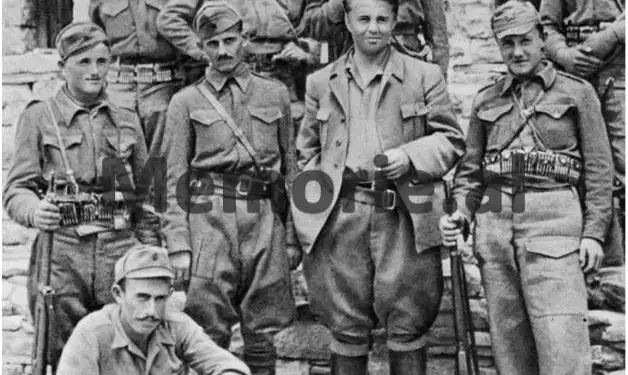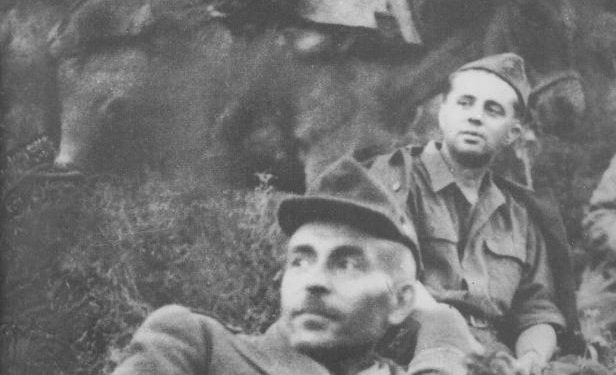By Gjergj Titani
Part four
Memorie.al / For the first time, we have been able to provide the witness account of many historical events. The conversation with Pandi Kristo, a senior figure of the Communist Party of Albania and the Albanian state, took place in Tirana, in the house of his son-in-law, Robert Vullkani, where he was forced to live, when he was released from exile, since the Albanian democratic state, never gave him a home. The regime, for which he fought, targeted him to liquidate Pandi Kristo, placing him in the group of Koçi Xoxes, convicted for “hostile activities”. For 42 years in a row, I would wander the prisons of the communist dictatorship and successive exiles, until communism was overthrown forever, at the beginning of the 90s. The interview was conducted in 1992 – 1993 and over the years, it was completed, according to the memories and family archive of Pandi’s daughter, Assembly Kristo (Vullkani), sister, veteran of the Anti-Fascist National Liberation War, his son-in-law, Robert Vullkani, and the memories of many contemporaries. Here is Pandi Kristo’s confession.
Continues from the previous issue
Mr. Kristo, what can you tell us about the most special case that happened in the spring of 1944, at the General Headquarters of the UNCL, stationed in Helma i Skrapar, when Hysni Kapo sent two German scouts accompanied by loyal partisans qualified, delivered to Cold Water in Vlora?
It was the spring of 1944. Meanwhile, I had been transferred to the General Staff and was performing a special task, which was never popularized, but which would later take on a definite institutional form. The headquarters and all other bodies were intensively preparing important materials for the development of the works of the Përmet Congress, which was one of the most important events in the history of Albania. The war had reached large proportions and was recognized both within the country and in the international arena. At the General Staff, the following had already arrived: Omer Nishani, Nako Spiru, Bedri Spahiu, Ymer Dishnica, Medar Shtylla, Baba Faj Martaneshi, Myslim Peza, Haxhi Lleshi, Mustafa Gjinishi, Manol Konomi, Spiro Koleka, in addition to permanent personalities, such as: Spiro Moisiu, Enver Hoxha, Koçi Xoxe, Ramadan Çitaku, Liri Gega, probably Miladin Popovic and Dushan Mugosha, etc.
Helmės oliči, a strategically chosen mountain village, was located in the heart of Skrapar. Right next to it, was the permanent supply base of the General Staff, the permanent base of the War, rich in foodstuffs. A little further, 5 kilometers south of Helmës, in a small field, was the air supply base of the British allied forces, also in order to meet the needs of the General Staff. This charming village had turned into an important center, buzzing with work. Couriers came and went non-stop and maintained stable connections with the headquarters of districts and partisan brigades.
The radio-telecommunication center was formed, headed by veteran and passionate communicators, Kadri Brahimi, Isak Lila and Servet Xama. This radio-telecommunication center carried out stable communication with the headquarters of the districts and brigades as well as with the outside, mainly with the Yugoslav neighbors and the Allied Headquarters of the Mediterranean. The headquarters security company was formed with Commander Axhem Abazi and Commissar Maqo Zoto. In the composition of this company, there were brave and experienced partisans such as: Niko Dulaku, Qazim Malaj, Kiço Negovani, Kadri Kiçaj, Ilia Kerenxhi, Ilo Nepsi, Rrapo Halili, Shaqo Gjini, Moisi Elezi, Gaqo Pojani, Haredin Meçe, Halim Zano, Minella Trebicka, and others, whom I do not remember, because of the long time that has passed.
Meanwhile, in the General Staff, in addition to the great work done by Enveri, Nakua, Bedriu, Liria, Çitaku, who processed the materials of the next Përmet Congress; instructions, circulars, information, various combat orders, for brigades, district party committees, helped many others. At this time, the special secretariat for the processing of Congress documents was created, headed by Nikola Shurbani, who had just returned from Italy, where he continued his studies in Medicine.
Who brought the German major and his “interpreter” to Helmes?
Couriers of the District of Vlora, Karafil Kapo, (Hysniu’s brother), a brave and experienced partisan, (who after the war, under rather enigmatic circumstances, committed suicide in Moscow and for that I was very sorry), and the other partisan from Tërbaçi , Shaqo Gjini, a correct boy, who did not leave a task unfulfilled, accompanied Zaho Koka to the General Headquarters, after the painful incident of the shooting of Ramize Gjebre, the charming and very wise ex-fiancée of the leader of the Albanian Youth, Nako Spiru. Those days, after this act was calmly analyzed once again, Zaho Koka was transferred to the 4th Assault Brigade of Korça, but the circumstances caused him to go back to his district, accompanied by these couriers, who also handed over to Hysni the post of the General Staff.
At this time, something very important and special happened in Vlora. Two very important spies of the German Secret Service, an athletic major with German citizenship and a civilian, who also played the role of translator, with Czech citizenship, who had been the leader of the spiritual gang of Vlora. The major’s statements were that he allegedly had very important announcements for the General Staff and requested that the partisan forces, to whom he was entrusted, take him there.
Hysni Kapo, after talking with them about general issues, thought of sending them accompanied to the General Headquarters, and so it was done. Hysniu started the German major and the civilian to Helmes, accompanying him with the same couriers who had delivered the post of the General Staff. He ordered his subordinates to travel at night, outside of populated areas, and to maintain military secrecy when the two spoke. The German major and his civilian translator arrived accompanied by couriers in Helmes, one day later, according to the instructions given by Hysniu.
You said the major was a skilled scout. Who interrogated him and his colleague?
The meeting with them immediately began, after we greeted each other and left a cafe, Bedriu and I, assisted by Enver’s courier, Niko Dulaku, began the investigations, which lasted until late, after midnight. First, we separated the two discoverers from each other and asked them separately. We asked the major first. From the conversation with him, which did not take the form of a strict intelligence investigation, we found out that he was actually interested in whether the General Staff would be interested in exchanging a number of German prisoners for some war personalities, who were arrested in Tepelena, Tirana and the extermination camp in Pristina.
In addition, he confirmed that, after the talks took a more crystallized form, he would also make other proposals, which for me and Bedriu, this was an agent’s bluff. We reported the first results of the investigation to Enver, Koç, Spiro and Miladin. They, after hearing our conclusions, instructed us to proceed with careful investigation as we had begun. In addition, we suggested to the above comrades that the major and his civilian “interpreter” should henceforth be kept bound and under arrest. After this proposal was approved, the investigation continued with the second person. He completely broke down and revealed everything he knew. He testified that the German major was a specialized detective and, as far as he knew, he had been tasked with discovering the location of the General Staff, and possibly destroying it.
After this denunciation, the two detectives never met each other again, and the leader of the Vlora gang, that is, the civilian detective, was shot in secret, so that his collaborator, the German major, would not find out. This fact made the German major extremely nervous, who, due to the naivety of the time, continued to be kept under arrest, on the first floor in the basement, while on the second floor, part of the members of the General Staff lived and had the use of the same toilet, which was located on the second floor. The toilet was almost in front of the door of the room, where Enveri, Spiro Moisiu, Myslim Peza, Sejfulla Maleshova, Miladini, and others were currently sleeping.
The room had only two country menders, and each of its occupants had a very practical zippered mattress-quilt, sent by English military aid. In the corridor in front of these premises there were two work tables, a clay water tank and next to one of the tables, Sejfulla Maleshova’s automatic was hanging on the wall. Apparently, the German major, a seasoned scout, had pinned his hopes on the physical fineness and young age of the partisan couriers, who played the role of his companions, and on this machine gun, which he had seen two or three days in a row, in the same place.
What was the German explorer’s plan?
One morning, apparently, after having worked out the plan of action well in his head, the German asked to go to the bathroom on the pretext that he felt a stomach ache. His companion, at that moment, was the partisan with combat experience, brave and loyal, Qazim Malaj, from Tërbaçi i Vlora, quite mature as a fighter, having also served in the military. Qazim, after taking the major out of the place where he was arrested, accompanied him through the stairs to the second floor, where the toilet was located. The German, after leaving there, calmly approached the water pitcher, which was located right under Sejfullai’s machine gun.
He asked Qazim to drink water, as he had done so many times before. The Malay Partisan motioned for him to take the water container himself. Meanwhile, he held his weapon, a short Greek soon, firmly in his hands. Without delay, the German complained that he could not lift the water container, so that Qazim would lie down and support his horse on the wall. But Terbaçiot, an experienced partisan, did not make this mistake. He stood ready, for any unexpected thing, and signaled again to the major to take the pitcher himself. At this time, the German grabbed the water container and after hitting the guard, grabbed the machine gun hanging on the wall, firing at him.
After the first shot, Sejfullai’s machine gun, which had not been cleaned for weeks, jammed. Fortunately, the brave partisan, managed to extend against the major, first. Then, the German went to the door where Enver’s group lived and started looking for the door handle, which was not an ordinary handle, but an ordinary village “beam”. The residents of the room had risen in alarm, had drawn their weapons and were ready to wait for the unusual resident. Anyone who entered would be eliminated. The vigilant guard shot the major for the third time in the body, which stopped trying to open the room and returned to where the bullet came from.
Surprisingly, after three or four hits, the enemy scout was still standing, but now harmless. After a while, Niko Dulaku, Enver’s personal guard, rushed into the corridor where the fight continued, but the major had already fallen. Qazimi, from the corridor, informed Enver and the others that the danger had passed. Enveri and the others left the room and thanked the partisan, but did not hesitate to tactfully make a remark. In fact, he had accompanied the major alone, when there was an order that he should always be accompanied by 2 people. This was the most complicated case, which could lead to the annihilation of the main group, the General Staff.
After a few days, a German biplane flew low over Helma, firing hand grenades, but the anti-aircraft machine guns of the group of English soldiers, which were located at the military supply dump in Staravecka, opened accurate fire and made it possible, for the plane to speed away. After this very dangerous event, double guards were placed in the buildings of the village; the headquarters company was reinforced, with other forces, until it was expanded to the battalion rank, with commander Hajdar Aranitas and Commissar Rita Marko.
You said just above that the proceedings of the Përmet Congress were being intensively prepared. Can you tell us your impressions about it?
The long column of marchers of the General Staff, from Helmësi i Skrapar, to the village of Odriçan in Përmet, where the leadership of the Anti-Fascist National Liberation War was to be located, was quite long, together with us marched the group of Englishmen, attached to the Headquarters general. Before we entered the village of Staravecka, where the English soldiers were located, from the supply base, I remember that Mustafa Gjinish was met by an English soldier, whose military rank I am not sure of. The Englishman gave Mustafa an envelope, and after signing it, he returned the envelope, while he put the document in his pocket.
On this occasion, a fierce debate took place between Miladim, Enver and Mustafa. Miladini insisted that Mustafa let him know the content of the document, while the latter told him emphatically that he would never give him the content of that letter. The irritation of the conversation went to such a level that Miladini accused Mustafa Gjinish as an agent of the English. Whereas, Mustafa, called Popovic, as the man who interfered in the internal affairs of our Party. I was very impressed by this conversation, but I am mentioning it because, in the Second Plenum of Berat, Enveri explained a mild version of this issue, while in his works, he explains a harsher version. When in Berat he says, that; didn’t know anything about this problem, since the clash had happened between Mustafa and Miladin, in the second version, he explains that the issue of Gjinishi’s “betrayal” was revealed to us by himself.
Even that conversation, which in Berat he explains took place between the two of them, recently, he says that he himself was a witness, but he goes so far as to say that he criticized and accused Gjinish as a traitor. About the Përmet Congress, I am not going to elaborate, because the materials for it are already known by everyone, but I can declare that in those days, I met with hundreds of comrades of the war, from all four corners of the country. The Congress showed the maturity and seriousness of the War, which was being waged by Albania, which was already recognized by the great anti-fascist coalition.
The decisions of this Congress were very important, because they sanctioned and legislated all the great war that our people had fought until then, but let’s not forget that, in addition to the festive part of the Congress, the enemy Operation of June was being prepared, but precisely in Përmet, on May 28, 1944, the decision was made to create the 1st Assault Division, which received the order of operational-strategic importance, for the beginning of breaking the general enemy line of June and to move north of the Shkumbin River and the beginning of teaching, for the liberation of Central and Northern Albania. A few months later, seven more divisions would be created, framed in three Korparmata, which for the conditions of our country, was a great help that the Albanian people gave in the Second World War.
I remember that, in Përmet, the officers of the English mission were sitting outside the hall where the Congress held its proceedings. I don’t understand what was the reason for this low and quarrelsome, childish attitude towards our war allies, when we, little Albania, had tremendous interests from our anti-fascist allies. And when we were trying with all our might to save the territorial integrity of the homeland. I was elected a member of the National Liberation Anti-Fascist General Council, and this very Congress gave the Anti-Fascist Committee the attributes of a temporary popular government, therefore, finally abrogated the form of the monarchical regime. Here the first military ranks were given, uniting the high command of the Albanian National Liberation Army and Enver Hoxha, he was given the highest rank, colonel-general, and was appointed Commander-in-Chief, while Koçi Xoxe, received the rank of lieutenant-general, and the first generals of our armed units were also appointed.
Those very days, I remember, the order came for Miladin to leave Albania. Enver escorted Miladin on foot, from Përmet to Këlcyre. From there, Miladini continued on his way, accompanied by a group of partisans, to Himara from where he would travel by steamer to Italy to be cured. I know that Miladini was sick with lungs since 1937-38 and was treated in a hospital in the city of Golnik. On the way, they talked for about two hours and eventually parted ways. These facts have become known to me also thanks to the new task that I had received, as the head of the Information Service.
Enveri and the rest of us never saw Miladin again, except for a rare friend who had to go to Yugoslavia or Kosovo. Meanwhile, the final phase of the war awaited us, which was the complete liberation of the country, but for this, new battles and great sacrifices would be needed. In the liberated Berat, we would form the new government and make the political-military balance, in the Second Plenum of the Central Committee of the KPSH, of our entire great and heroic war…! Memorie.al
The next issue follows




